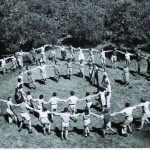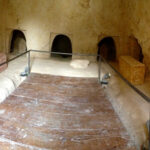Yosef Haim Brenner’s stories are steeped in his own experiences. Deeply troubled by the Jewish people’s desperate state, he saw no solution in the land of Israel yet spoke up for it heroically. In life, and even more so in death, Brenner was a symbol – but of what?
At the turn of the 20th century, in a letter to his friend Uri Nissan Gnessin, young Yosef Haim Brenner summed up the purpose of humanity:
In short, we must sacrifice ourselves to diminish the evil in the world – the evil of hunger, slavery, idleness, hypocrisy, and so forth. One must understand everything, fathom all, and keep mysticism and imagined fancies at a distance. There must be more realism and more holiness in the world. The Jewish people’s lives must be rectified, so they can be normal. My soul’s terrible torment is caused by my general doubtfulness: is there any solution? Are we moving forward? […] I question my own abilities […].
A few days ago I became vegetarian.
I don’t understand how you can write a historic epic […]. Do you know our people are dying? Do you know the world is sick? Don’t you know despair is claiming lives? Have you no eyes? (Yosef Haim Brenner, Correspondence [Davar, 5701/1941], vol. 1, p. 86 [Hebrew])
The ideological difference between these two men, both later well-known writers, leaps from between these lines. Gnessin was tall, distinguished-looking, delicate, and self-contained, the son of Rabbi Yehoshua Natan Gnessin, dean of the yeshiva in the Russian town of Pochep. Rabbi Gnessin read all the progressive Hebrew journals, then distributed them among his students. Uri Nissan wrote deeply personal, introspective monologues prefiguring the stream-of-consciousness novels of James Joyce and Virginia Woolf by a decade or so.
Yosef Haim Brenner was the opposite: short, stocky, easily roused, and given to extreme outbursts. After his Orthodox family rejected him for his secular leanings, preferring his scholarly brother Shmuel, Yosef Haim struggled to find his way. Rather than art for art’s sake, he sought “realism and holiness.” His writing confronted all the evil in the world head-on, recognizing the utter hopelessness of the Jewish people’s plight.
Brenner veered between belief in Jewish autonomy in Europe and Zionism, sometimes despairing of both. He moved between his literary career and socialist activism, interspersed by periods of deep depression. Even in this short letter, he shifts from self-doubt to enthusiastic devotion to a new cause, vegetarianism.
In her classic biography of Brenner, historian Anita Shapira points out that whenever asked about himself, he told questioners to read his books. She describes her difficulty in reconstructing a life that became a myth. Even Brenner’s friends’ recollections of events were colored by how he wrote about them.


As different in appearance and temperament as in their writing. Friends Uri Nissan Gnessin and Yosef Haim Brenner







